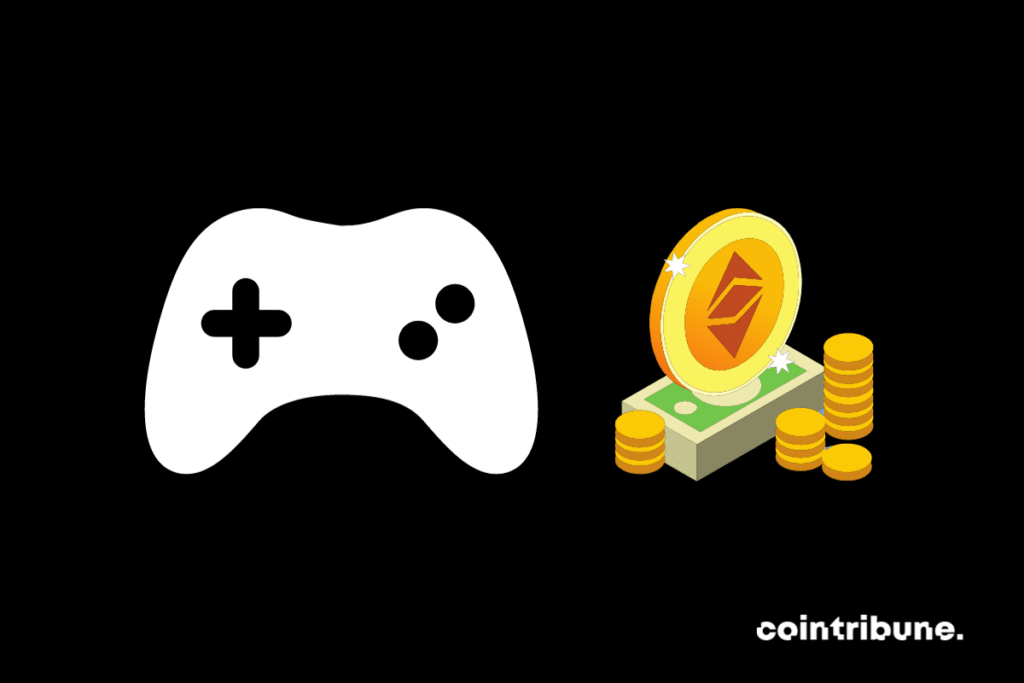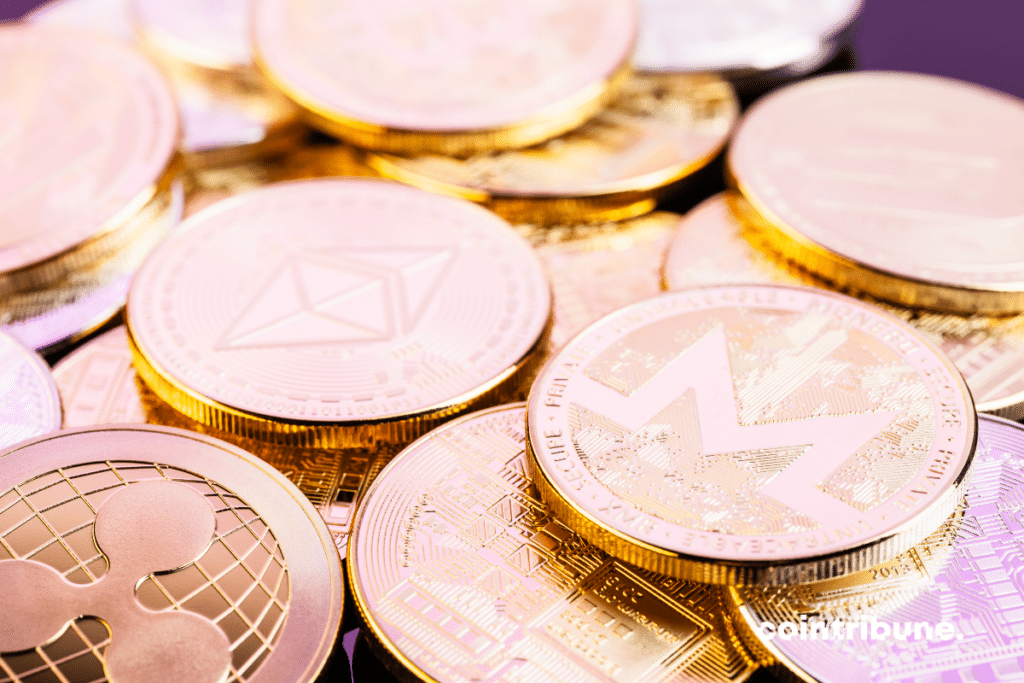What Are the Altcoins Related to Video Games?
The rise of cryptocurrencies in the gaming sector is a phenomenon that is increasingly attracting attention. These digital currencies, initially popular in finance and investment, are now finding their place in the gaming universe. Altcoins, variants of traditional cryptocurrencies like Bitcoin, stand out for their unique features and adaptability to the specific needs of video games. They not only offer a new form of transaction within games but also open up unprecedented possibilities for player engagement and the development of the virtual economy. This article presents the main altcoins related to video games and highlights their influence in this rapidly expanding industry.

The Importance of Altcoins in the Gaming Ecosystem
Altcoins, these alternative digital currencies to Bitcoin, have taken a significant place in the gaming ecosystem. Their integration into the gaming world opens up new economic and playful perspectives, redefining the interaction between players, developers, and the blockchain.
Transformation of the Gaming Economy by Altcoins
Altcoins have revolutionized the gaming economy by introducing new economic models. Instead of being limited to traditional in-game transactions, altcoins enable a decentralized and transparent economy. Players can now acquire, exchange, and invest in digital assets, such as tokens or NFTs directly linked to their favorite games. This evolution has given rise to blockchain-based gaming platforms, where currencies such as AXS (Axie Infinity) or SAND (The Sandbox) play a crucial role. These currencies offer players not only a method of payment but also an active role in the game economy, transforming their gaming experience into a potential investment opportunity.
Enhancing Player Engagement through Altcoins
The use of altcoins in video games has significantly increased player engagement. By allowing players to truly own digital assets and participate in the game economy, altcoins create a stronger sense of belonging and personal investment. For example, in games like Axie Infinity, players can breed and trade digital creatures, Axies, using the AXS token. This “play-to-earn” approach motivates players not only to play for fun but also to actively participate in the game economy. This creates a more engaged and invested community of players, where each player’s contribution has a direct impact on the game ecosystem.
Innovation and Creativity Driven by Altcoins
Altcoins stimulate innovation and creativity in game development. Game developers are now able to explore new genres and game mechanics, thanks to the flexibility and possibilities offered by blockchain and cryptocurrencies. Blockchain-based games, using altcoins, allow for the creation of unique gaming experiences where digital assets play a predominant role. This opens the door to games where players’ economic decisions directly influence the game world, creating immersive and dynamic experiences. Furthermore, the decentralized nature of altcoins encourages greater transparency and fairness in games, giving players increased confidence in game systems.
Altcoins as Catalysts for New Monetization Opportunities
Altcoins offer game developers new monetization opportunities. Beyond traditional subscription-based or in-game purchase models, altcoins enable the development of innovative economic models. For example, developers can integrate reward systems based on tokens, where players earn cryptocurrencies by completing certain tasks or reaching goals in the game. This creates an ecosystem where players are rewarded for their engagement and contribution to the game, while generating new revenue streams for developers. This approach has the potential to attract a wider audience, ranging from casual gamers to serious investors interested in the economic aspect of video games.

Popular Altcoins in the Video Game Industry
The video game industry is undergoing a transformation thanks to the emergence of altcoins, these alternative cryptocurrencies that redefine economic and playful interactions in the virtual world. These digital tokens offer unprecedented possibilities, from creating virtual worlds to monetizing players’ skills. Let’s take a closer look at some of the most influential altcoins in this sector.
The Sandbox (SAND)
The Sandbox is a blockchain-based gaming platform that uses the SAND token. This virtual world allows users to create, own, and monetize their game creations and experiences. With the SAND token, players can purchase virtual land and assets, create games and interactive experiences, and participate in the game economy. This system offers creative freedom and monetization opportunities that attract a growing community of players and creators. The Sandbox stands out for its decentralized approach, giving users total control over their creations and gaming experience.
Meme Kombat (MK)
Meme Kombat, using the MK token, is a blockchain game that combines internet meme humor with fighting game mechanics. Players can collect, breed, and battle with characters inspired by popular memes, creating a fun and engaging gaming experience. MK serves as currency in this universe, allowing players to buy, sell, or trade characters and in-game items. This game illustrates how altcoins can bring a playful and community-oriented dimension to the world of cryptocurrencies, creating a space where humor and gaming meet.
Decentraland (MANA)
Decentraland is a decentralized virtual universe powered by the MANA token. In this world, users can buy parcels of land, build spaces and applications, and explore others’ creations. MANA is used for all transactions within Decentraland, offering a robust virtual economy. This game represents a major advancement in blockchain gaming, where users have complete freedom of creation and exploration, supported by a blockchain-based digital economy.
RobotEra (TARO)
RobotEra is a recent blockchain game that uses the TARO token. In this game, players can create and manage robots, explore virtual worlds, and participate in building the game universe. TARO is the main currency used in the game, allowing players to purchase resources, tools, and other necessary items to progress. RobotEra stands out for its innovative approach to world creation and resource management, offering an immersive and strategic gaming experience.
Axie Infinity (AXS)
Axie Infinity is a blockchain-based combat and collection game, where players breed, battle, and trade creatures called Axies. The AXS token is at the heart of the game economy. It is used for all transactions and interactions. This game has gained massive popularity for its “play-to-earn” economic model, where players can earn real income by playing. Axie Infinity is a perfect example of how altcoins can create economic opportunities in the world of video games.
Tamadoge (TAMA)
Tamadoge is a blockchain game that uses the TAMA token. In this game, players can raise, train, and battle with virtual creatures called Tamadoge pets. TAMA serves as currency in the game, allowing players to purchase items, accessories, and other resources. Tamadoge offers an interactive and engaging gaming experience, where players can see their efforts rewarded with token gains, illustrating the potential of altcoins in creating “play-to-earn” games.
ApeCoin (APE)
ApeCoin is a token associated with the Bored Ape Yacht Club NFT universe. Although not directly related to a specific game, APE has become a popular altcoin in the video game industry due to its association with NFTs and metaverse projects. ApeCoin is used to purchase NFTs, participate in events, and access exclusive experiences in the Bored Ape ecosystem. This token illustrates how altcoins can transcend boundaries between games, digital art, and popular culture.
TG. Casino (TGC)
TG. Casino is a blockchain project that integrates casino gaming into the cryptocurrency universe. Using the TGC token, this virtual casino offers a variety of gambling and betting games, where players can wager and win tokens. TGC enables a transparent and secure gaming experience, thanks to blockchain technology. This project shows how altcoins can be used to reinvent traditional gaming concepts, adapting them to the digital and blockchain era.
The Future of Altcoins in the Video Game Industry
The video game industry, in constant evolution, is heading towards a new era marked by the increasing integration of altcoins. These alternative cryptocurrencies offer innovative possibilities, redefining economic and playful interactions in games. The future of altcoins in this sector promises exciting developments, influencing how games are designed, played, and valued.
Expansion of Altcoin-Based Gaming Economies
The future will likely see a significant expansion of altcoin-based gaming economies. These digital currencies make it possible to create decentralized economic ecosystems within games, where players can earn, trade, and invest using game-specific tokens. This approach offers greater freedom and autonomy to players, allowing them to monetize their skills and time spent in the game. Moreover, altcoins encourage innovation in game development, with projects like Axie Infinity and The Sandbox leading the way towards more interactive and immersive gaming experiences. These platforms not only entertain; they create real economic opportunities for players, redefining the concept of “play-to-earn.”
Strengthening Community and Player Engagement
Altcoins are likely to strengthen community and player engagement in the video game industry. By offering players the opportunity to own a stake in the game world in the form of tokens or NFTs, altcoins create a sense of belonging and personal investment. This approach turns players into active economic actors within their favorite games, increasing their engagement and loyalty. Blockchain-based games, like Decentraland and RobotEra, offer spaces where communities can develop around common interests, fostering collaboration and social interaction. This trend towards more communal and participatory gaming experiences is likely to intensify in the future, with altcoins playing a central role in facilitating these interactions.
Technological Innovation and New Monetization Opportunities
The future of altcoins in the video game ecosystem will also be marked by ongoing technological innovation and the emergence of new monetization opportunities. Blockchain technology, which underpins altcoins, is evolving rapidly, offering increasingly advanced possibilities for game development. This technological evolution opens the door to more complex and secure games, where transactions and interactions are transparent and reliable. Furthermore, altcoins allow game developers to explore new economic models. Instead of relying solely on game sales or in-game purchases, developers can integrate reward systems based on tokens, creating new revenue streams and enhancing player engagement. Projects like Tamadoge and ApeCoin illustrate how altcoins can be used to diversify revenue streams in the video game industry.
Conclusion
The integration of altcoins such as The Sandbox (SAND), Axie Infinity (AXS), and Decentraland (MANA) into the video game industry represents a major advancement. These cryptocurrencies not only transform how games are played and valued but also how communities interact within these virtual worlds. The future promises continued expansion of these digital economies, with technological innovations and diversified monetization models.
Maximize your Cointribune experience with our "Read to Earn" program! For every article you read, earn points and access exclusive rewards. Sign up now and start earning benefits.
The Cointribune editorial team unites its voices to address topics related to cryptocurrencies, investment, the metaverse, and NFTs, while striving to answer your questions as best as possible.
The views, thoughts, and opinions expressed in this article belong solely to the author, and should not be taken as investment advice. Do your own research before taking any investment decisions.